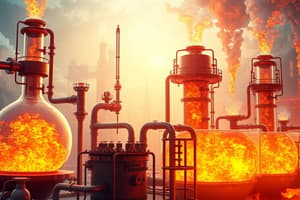Podcast
Questions and Answers
What is the process called when crude oil is separated into fractions with similar boiling points?
What is the process called when crude oil is separated into fractions with similar boiling points?
Fractional distillation
What happens to the heavier fractions obtained in fractional distillation?
What happens to the heavier fractions obtained in fractional distillation?
They are further cracked into useful alkanes and alkenes with lower Mr values
What are alkenes known for in terms of reactivity?
What are alkenes known for in terms of reactivity?
Alkenes are reactive molecules
What university did Philippa study at and what did she graduate with?
What university did Philippa study at and what did she graduate with?
What teaching qualification did Philippa complete?
What teaching qualification did Philippa complete?
Explain the systematic method for naming alkanes.
Explain the systematic method for naming alkanes.
Why do larger alkane molecules have higher boiling points?
Why do larger alkane molecules have higher boiling points?
What are the physical properties that characterize alkanes?
What are the physical properties that characterize alkanes?
Give an example of an isomer of butane and explain its structure.
Give an example of an isomer of butane and explain its structure.
How are alkanes extensively used in various sectors?
How are alkanes extensively used in various sectors?
What is cracking and how does it relate to the production of alkanes?
What is cracking and how does it relate to the production of alkanes?
Explain the concept of chain isomerism in alkanes with an example.
Explain the concept of chain isomerism in alkanes with an example.
Describe position isomerism in alkanes and provide an example of isomers with different branching patterns.
Describe position isomerism in alkanes and provide an example of isomers with different branching patterns.
How are alkanes used as solvents, and what types of substances do they dissolve?
How are alkanes used as solvents, and what types of substances do they dissolve?
Explain the process of cracking in relation to alkanes. How does cracking transform larger alkanes?
Explain the process of cracking in relation to alkanes. How does cracking transform larger alkanes?
What are the primary uses of alkanes in the industry, and how do their physical properties contribute to these applications?
What are the primary uses of alkanes in the industry, and how do their physical properties contribute to these applications?
Discuss the significance of systematic nomenclature of alkanes in chemistry. Why is it important for identifying and studying these compounds?
Discuss the significance of systematic nomenclature of alkanes in chemistry. Why is it important for identifying and studying these compounds?




